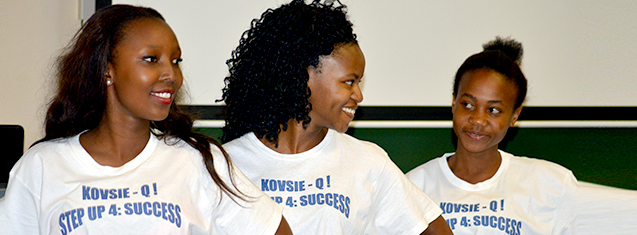Latest News Archive
Please select Category, Year, and then Month to display items
06 April 2018
Photo Rulanzen Martin
 From the left: Dr Thulisile Mphambukeli, leader of the BRICS research team that is exploring the political economy of water and food security, and her research partner, Dr Victor Okorie.
From the left: Dr Thulisile Mphambukeli, leader of the BRICS research team that is exploring the political economy of water and food security, and her research partner, Dr Victor Okorie.
A Brazil, Russia, India, China and South Africa (BRICS) delegation is to hold the 10th Annual BRICS Summit in the last week of May 2018 in Johannesburg. Dr Thulisile Mphambukeli, leader of the University of the Free State (UFS) research team alongside Dr Victor Okorie from the Department of Urban and Regional Planning, in collaboration with Prof Lere Amusan of North-West University, will ensure that water and food security is a prominent feature on the gathering’s agenda.
First, the project titled: “Exploring the political economy of water and food security nexus in BRICS and Africa” will debut at the National Institute for the Humanities and Social Sciences BRICS Think Tank Forum”.
According to Dr Mphambukeli, the key to water security is attitudinal change by means of education and conscientisation. This, she is adamant about, holds the potential to drive behavioural adjustments in the way society interacts with water.
Genetic and social approaches
Dr Okorie asserts that if strides towards reducing the demand for water were to be made, research efforts should be geared towards effecting changes at DNA level. Meaning we need to explore waterwise ways that enable crops and animals to thrive optimally.
The project also looks at social dimensions of water such as flushing a toilet. “Research activities on redesigning toilets, especially the urinal, where more than nine litres of water are used to flush less than one cubic centimetre of urine, are timely in the context of managing water and the food nexus crises,” said Dr Okorie.
Combining the genetic and social approaches would allow us to produce more with a smaller water footprint. This can be made possible by implementing precision agriculture which is about estimating and applying exact quantities of water and nutrients needed for the production of crops or the raising of livestock.
Paradigm shifting policies
Prof Amusan said the team intended to propose functional solutions that take the quality of water into consideration. Equitable production and distribution of water depends on endorsing policies of co-production between citizens, governments and the public sector. BRICS member states mutually consider water and food security as an issue of paramount significance, hence its feature on this prestigious summit’s agenda.
The beginning of the person you want to be
2015-01-29

“The University of the Free State is a caring community where everybody counts.” With this message, Dr Choice Makhetha, Vice-Rector: External Relations welcomed our first-years on the Qwaqwa Campus.
“Whether you are a first-year or a senior student, whether you are a cleaner or a research professor, we all have one thing in common: our humanity,” Dr Makhetha said.
“This is the stage where you are going to shape the person you want to be,” Dr Makhetha said to the audience of eager first-year students who had already spent a week undergoing a rigorous Gateway Orientation programme.
“A lot of things will happen during your stay here and one of them is making friends. Make friends with people from outside your comfort zone,” Dr Makhetha added. “Make friends with those who have a totally different background from yours so that you can learn, broaden and enrich your life.”
“Read broadly and ask questions – for questions will take you far beyond your area of study,” she said.
Zethu Mhlongo, Deputy President of the Qwaqwa Campus Student Representative Councisel (SRC), encouraged first-years to always remember why they chose our university in the first place.
“Enjoy your stay, get your degree and step up for success,” Mhlongo said.